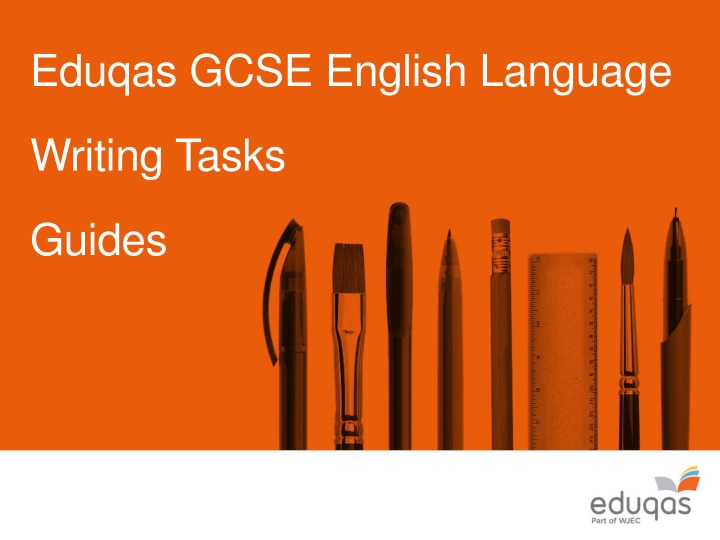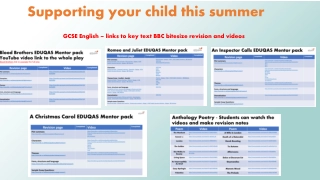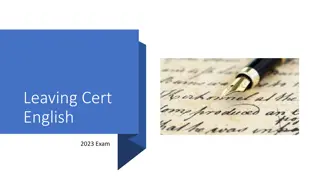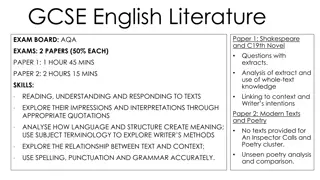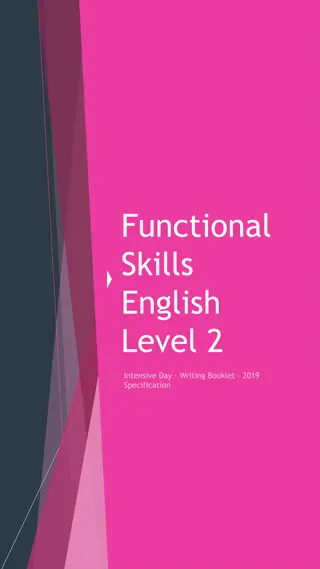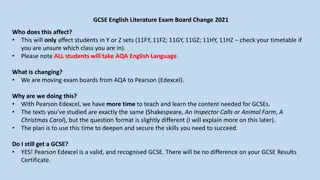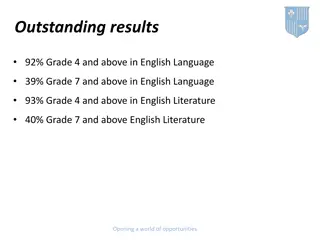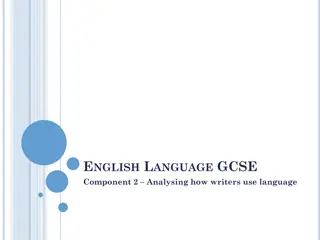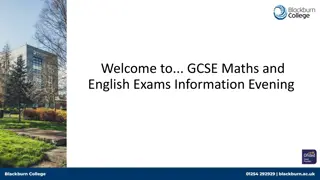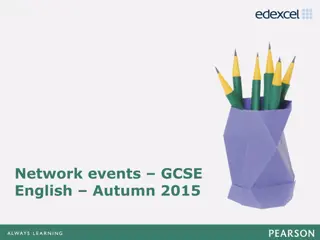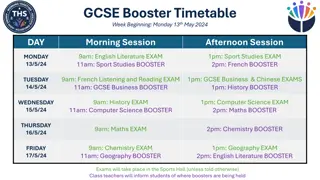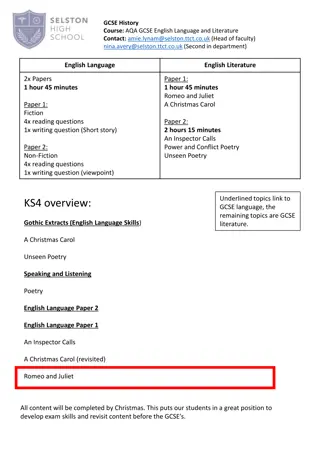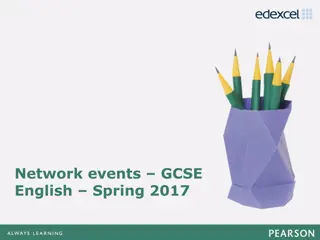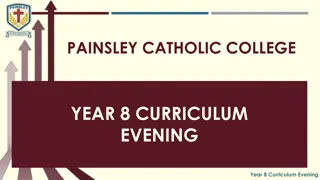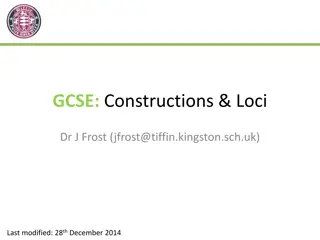Mastering Guide Writing for GCSE English Language Exam Success
Enhance your guide writing skills for GCSE English Language with this comprehensive presentation covering audience considerations, purpose, register, format, sample questions, and tips for writing successful guides. Dive into the essential elements of guide writing, explore sample tasks, and learn effective techniques to engage and inform your readers. Boost your confidence in creating engaging and informative guides through practical guidance and examples.
Download Presentation

Please find below an Image/Link to download the presentation.
The content on the website is provided AS IS for your information and personal use only. It may not be sold, licensed, or shared on other websites without obtaining consent from the author.If you encounter any issues during the download, it is possible that the publisher has removed the file from their server.
You are allowed to download the files provided on this website for personal or commercial use, subject to the condition that they are used lawfully. All files are the property of their respective owners.
The content on the website is provided AS IS for your information and personal use only. It may not be sold, licensed, or shared on other websites without obtaining consent from the author.
E N D
Presentation Transcript
Eduqas GCSE English Language Writing Tasks Guides
Aims of this presentation introduce guide writing discuss features of guide writing re-visit previous guide writing tasks share tips and look at how to write a successful guide consider sample plans and extracts provide full marked examples link to a revision sheet on guide writing
Introduction to guide writing What do you need to know? Audience Have you been given a specific audience in the task title? Who is the guide aimed at (teenagers, the general public, younger people)? What details can you include to interest the audience? Purpose What is your writing trying to achieve? For example, you may need to consider the following: - A guide gives a reader a tour through a topic. Do you want to inform, persuade or entertain them? A guide has a strong personal viewpoint throughout A guide usually tries to get the reader to share the writer s views - -
Introduction to guide writing What do you need to know? Register What is the appropriate tone for your writing? This depends on what you feel about the topic you are writing about. If your guide is to share negative information then the tone will be negative, critical and serious. If your guide is positive the tone may be upbeat, lively and informative. Format What do you need to know about layout? There are no specific rules for a guide but you should give your guide a clear title. All guides should be organised into paragraphs. Subheadings can be used, if relevant.
Sample questions Writing a guide exam tasks: 2020 Write a lively guide to surviving the teenage years for a school/college magazine. [20] Writing a guide sample tasks: Write an informative guide for new students who plan to join your school or college. [20] Write a lively guide for visitors to your local area. [20] Write a guide for other GCSE students giving advice and information on how to survive their GCSE year. [20]
Getting to grips with writing a guide Write an informative guide for new students who plan to join your school or college. [20] To help you plan a response to this question, can you answer the following questions? Questions What are your views about your school and college (strengths and weaknesses)? What would someone new need to know? The audience you are writing for is other students. How will you make them trust you/listen to you? What tone or techniques will you use? How will you set out your work? What title will you use? How will you begin your guide so that someone wants to continue reading it? How will you prioritise your information? What are the most important facts for someone new?
Features of guide writing The Rough Guide to Sidmouth This delightful Regency seaside town has for a long time now claimed the title as one of the south west s most popular tourist resorts. The question is, Why? Naturally the immediate response is to say the beach. Yes, I can see the attraction of a stony beach complete with promenade and overpriced ice-cream kiosks to those from large, built-up cities but for those who have experienced the clear turquoise water of the beach at St Ives or the golden sands of the Lizard peninsular, this is nothing special. Perhaps it is the lush and leafy Connaught Gardens? I think not. In comparison to the Lost Gardens of Helligan or the Eden Project they seem more like someone s back garden than a slice of paradise. Is it then that Sidmouth is home to a vast variety of shops and cafes or even historical and cultural sites? No, sadly, this is not the case. I have searched high and low yet I still cannot find anything to particularly recommend Sidmouth over any other small seaside town with an overinflated opinion of itself. Yes, Sidmouth is really nothing special. Yet year after year the tourists return in their droves to mill around the town and sit around on deck chairs. My only advice is to ensure that if your heart is set on going to Sidmouth, wait until August when the folk festival arrives. This at least brings a little vibrancy and variety to a town which seems stuck in a time warp. If it s sitting in hotels with Devon s answer to the cream tea or strolling down the promenade with hundreds of other tourists (and the elderly population who seem so attached to the area) then Sidmouth is the place for you. Sadly, I entered the town with high expectations, but will not be going again. Include a heading. Make it clear what you are writing about. Appeal to your reader. Ask questions that will encourage them to think of the answers. Compare what you are writing about to other familiar things/places. This will help the reader to build up a picture of it. Always organise your writing into paragraphs. Paragraphs will help you to make your ideas clear and easy to follow. Repeat the topic that you are writing about so the reader has it in their mind at all times. Use suitable language to appeal to the reader. This guide is negative, so the language is negative too. Use punctuation effectively these brackets have been used to add extra information.
Planning an answer Write a lively guide to surviving the teenage years for a school/college magazine. Write your guide. [20] Write section about becoming a teenager and the horrors of puberty. How will you introduce the guide? What are the main ideas you want to include? Write section about top survival tips to get through this stage. Surviving the teenage years Conclude writing with final comments and views about the topic. Write section about school and the dreaded GCSE exams. Write section about parents and how they can be a nightmare. Task: look at this plan. What could you add to it? How would you make it lively? In what order would you write each of these sections (you can number them if it helps)?
Planning an answer Write a lively guide to surviving the teenage years for a school/college magazine. Write your guide. [20] We can plan in different ways. Here is an alternative plan to the same question as the previous slide. How would you would plan this task and what you would include? Surviving the teenage years Introduction: outline the horrors of becoming a teenager (spots, bad hair, relationships, parents etc). Give personal angle and anecdote. Reassure readers that they can survive. Paragraph 1: Parents talk about how parents behave and how they embarrass teenagers. Give advice on how to appease parents and how to keep them happy! Share anecdotes on how annoying they can be (give reasons why too only because they care)! Paragraph 2: Education school/GCSEs/College/Options explain how other people feel stress they are not alone. Give advice on how to make it all manageable. Give friendship and revision tips etc. Paragraph 3: You are not alone section about how everyone goes through the same experiences, give advice on how to cope and where to get help. Try to make them laugh. Conclusion: Final advice add some humour to keep things lively. Ask questions to see how the reader is feeling and share final anecdotes/ideas.
Guide writing sample extract Write a lively guide to surviving the teenage years for a school/college magazine. Write your guide. [20] [20] So, you have turned 13. You are now officially a teenager. What next? Will life be fun and exciting? Will you change overnight as you head towards becoming an adult? Will you suddenly be filled with confidence? The answer, my friends, is NO. The teenage years can be brilliant, but they can also be your worst nightmare. Spots, growing pains, greasy hair (YUCK) are all aspects of becoming a teenager that we d all rather didn t happen. Look at this paragraph and the plan on the previous page. The student here outlines the horrors of becoming a teenager but they have forgotten to reassure their reader. Can you think of one or two sentences that you could add here to complete the paragraph?
Guide writing sample answer Write a guide for other GCSE students giving advice and information on how to survive their GCSE year. [20] The following slides contain a marked answer to this task. It is a highly competent and imaginative piece that is secure Band 5 in every area. Read the guide and think about: 1. How the student has interpreted the question. 2. The comments made by the examiner. 3. The techniques they have used to engage the reader. 4. Where you could add any further details.
Guide writing task Write a lively guide for visitors to your local area. Write your guide. [20] The example that you looked at on slides 12 and 13 was a very carefully written and imaginative guide. Use some of the ideas from this guide to help you complete the task above. Use the guidance on how to plan from the previous slides in this presentation and plan your own answer to this question. When you have a plan that you are happy with spend 25-30 minutes writing an answer to this question.
Finally We hope this resource has been helpful to you. For further information and resources for GCSE English Language you can visit the digital resources section of our website. The following link will take you there: https://resources.eduqas.co.uk/Pages/ResourceByArgs.aspx?subId=11&lvlId=2
